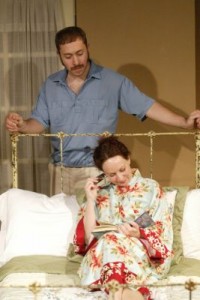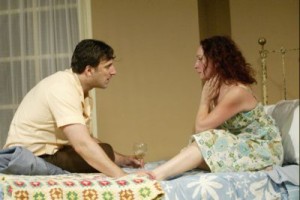
It’s New Year’s Eve, 1968, and Jerry is confessing to Emma his love for her, in the very bedroom she shares with her husband Robert, Jerry’s best friend. “I must tell you,” Jerry declares passionately. “I want to tell you. I have to tell you. You’re lovely. I’m crazy about you. All these words I’m using, don’t you see, they’ve never been said before. I’m bowled over, I’m totally knocked out, you dazzle me, you jewel, my jewel…” Heady words, and with them Jerry and Emma begin a love affair, virtually under the eyes of his wife and her husband, an affair which will last seven years, only to have become a distant memory when they meet again, nine years later.
If you think I’ve given away pretty much the entire plot of Harold Pinter’s Betrayal, you’re absolutely right, but I have a good excuse. You see, Pinter begins Betrayal in 1977 with Jerry and Emma meeting for the first time since their 1975 breakup, then moves back in time, so that when we finally see the joy and optimism and sense of discovery at their first declaration of love, we see it with the knowledge of how sadly it all turned out.
This backward-moving structure is what elevates Pinter’s play from good to great, and what makes seeing Betrayal such a treat for theatergoers. That Pinter’s words are being brought to real and vivid life by a trio of superb actors at San Pedro’s Little Fish Theatre makes the current production a rich and tasty treat indeed.
Suzanne Dean is Emma, and I can’t imagine another L.A. actress playing the role any better than Dean does. From the first scene, in which Emma’s casual words to Jerry (“You look well…” and “I though of you the other day…”) and her innocuous responses to his question “How’s everything?” (She replies “Oh, not too bad…”) mask oceans of memories and regrets, Watch Dean’s eyes and you can see her thinking, remembering, regretting. Listen to the nuances in her voice. Watch the way she chokes up when she reveals to Jerry that she’s finally told Robert, her husband, of their lengthy affair. And later, as the play moves towards that first declaration of love, pay attention to how Dean’s face lightens, brightens, softens from the Emma we’ve first seen. You’ll discover as I have, that Dean is one of L.A. theater treasures.
It certainly helps that director Bert Pigg, besides guiding his cast to pitch perfect performances, has cast the two men in Emma’s life so well. Both Matthew Brenher (Jerry) and Scott Hartman (Robert) are commanding stage presences, broad shouldered and powerfully built, but whereas Hartman is dark and brooding, Brenher is sunny and dashing. It’s easy to see Emma falling for Hartman’s Robert, but it’s equally easy to see how she could be swept off her feet by Brenher’s Jerry. When Robert remarks casually that he may have hit Emma once or twice, it’s not hard to imagine. It’s equally easy to believe in Jerry’s sincerity when, at the end of his affair with Emma, he declares that for him it wasn’t about “fucking,” it was about “loving.” Both Brenher and Hartman are beautifully cast, and do terrific work.
Pigg is to be saluted for keeping Betrayal set firmly in the 70s. A production reviewed here last year brought the story up to the 2000s. It works much better in the pre-email, pre-cell phone era of letters sent by snail mail, and telegrams delivered to your door—and in a time when AIDS was still ahead on the horizon.
With Pinter, it’s sometimes as much about the silences as it is about the words. (Just count the number of times the word “pause” is inserted between parentheses in Betrayal’s script.) Here too cast and director are in perfect sync with playwright, and it’s precisely in moments of silence that so much can be read in these actors’ eyes.
Pinter can be ruined by bad British accents. In Little Fish’s production, one cast member happens actually to come from England, but the accents of the other two are so perfect, you may find it impossible to guess which one is real and which ones are fake.
Andy Kallok appears briefly as an American-accented waiter working in an Italian restaurant in England.
Betrayal runs Wednesdays and Thursdays on the same stage used Fridays and Saturdays for Little Fish’s main stage production of Hay Fever. It is simple in the extreme (a table brought out, a double bed rolled in), but works quite well for Betrayal, with its French doors and curtains meshing nicely with the play’s locales. Lighting is also very basic, lights up, lights down. On the other hand, costumes and sound design both deserve mention. Christa Armendariz’s choice of outfits for her cast sets the play firmly in the 70s, with lots of polyester and wide ties and lapels, and in the final scene, Emma’s 1968 party dress features the Empire waistline so popular at that time. David Graham’s sound design is one of the best I’ve heard in a straight play, the ambient noise for each scene a perfect fit, whether party noises or traffic or seagulls and shouts in Italian. His multimedia design effectively combines slides of 70s London and Venice with pop hits of the era. The slide show preceding each scene ends with the location, season, and year of the scene. One suggestion: Pinter’s script indicates which scenes take place “later,” i.e. in actual chronological order. Simply inserting that word before Scenes 2, 6, and 7 would be of service to the audience.
I’m thrilled to have discovered Little Fish Theatre and plan to return as often as my very crowded schedule permits. Pinter lovers, or really any theater lover within driving distance of San Pedro (it’s really not that far away) should make it a point to see Betrayal. It’s truly that good!
Little Fish Theatre, 777 Centre St., San Pedro.
www.LittleFishTheatre.org
–Steven Stanley
April 22, 2009




 Since 2007, Steven Stanley's StageSceneLA.com has spotlighted the best in Southern California theater via reviews, interviews, and its annual StageSceneLA Scenies.
Since 2007, Steven Stanley's StageSceneLA.com has spotlighted the best in Southern California theater via reviews, interviews, and its annual StageSceneLA Scenies.







 COPYRIGHT 2024 STEVEN STANLEY :: DESIGN BY
COPYRIGHT 2024 STEVEN STANLEY :: DESIGN BY